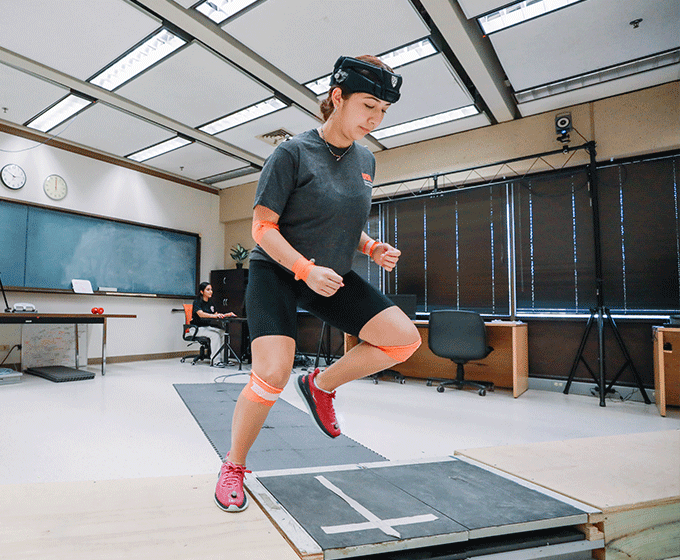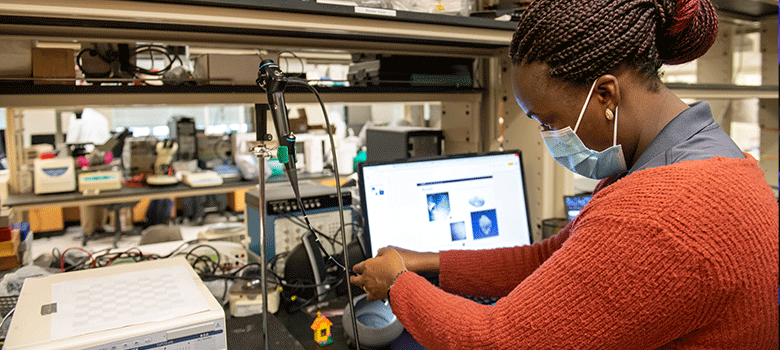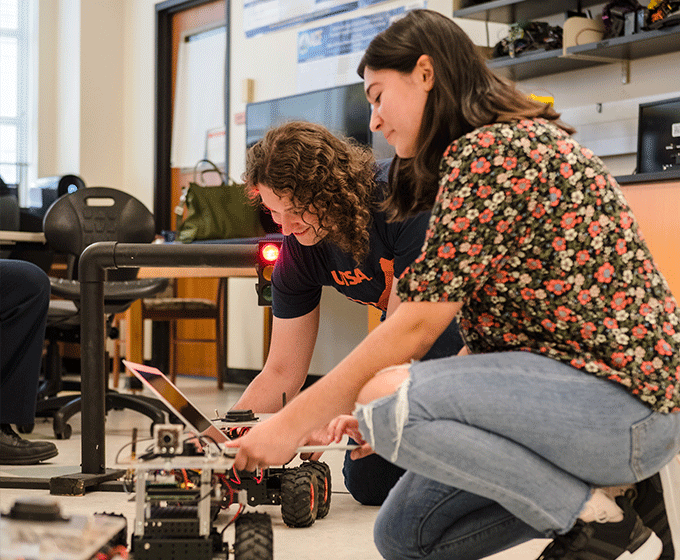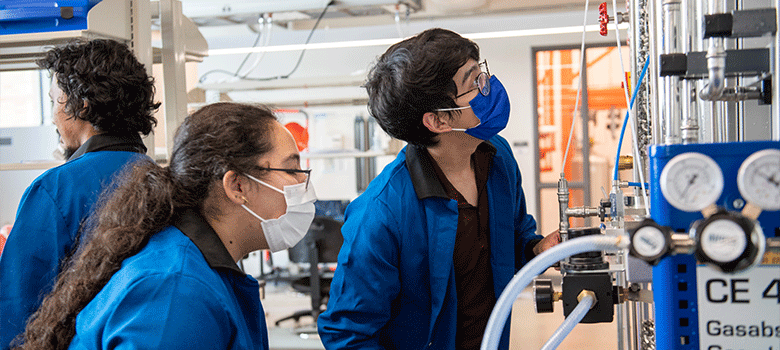
A kinesiology student from the UTSA College for Health, Community and Policy performs a exercise in one of the labs.
FEBRUARY 26, 2024 — Fueled by its commitment to collaboration, innovation and entrepreneurship, UTSA posted record-high research expenditures in FY 2023, according to institutional data released today.
The university’s research expenditures grew to $152.3 million, up 7.5% from $141.7 million the previous year ($158.5 million counting unrecovered indirect funds), making FY 2023 the fourth consecutive year that UTSA’s annual research expenditures exceeded $100 million. Leaders at UTSA attribute the increase to the world-class faculty that the university continues to attract and recruit and internal strategies at the university that have increased support for existing faculty.
Work underway in UTSA’s 30 research centers and institutes accounted for $41.8 million in expenditures in FY 2023, with the Cybersecurity Manufacturing Innovation Institute, Brain Health Consortium, South Texas Center for Emerging Infectious Diseases, and Texas Sustainable Energy Research Institute collectively accounting for 50.7% of that spending.

The Medical Design Innovations Laboratory, located in the Biotechnology, Science and Engineering Building, provides space and resources for students to work on medical device design problems.
At the same time, faculty members and researchers received 198 awards during FY 2023, totaling $42.0 million in new funding for the university.
This research-intensive environment underscores UTSA’s role as an anchor for experiential learning and workforce development.
“UTSA is a Carnegie R1 institution that is laser-focused on growing Texas’ economy through research and development, and it has created an environment that is attractive to nationally recognized researchers who want to leverage their innovation and expertise for the greater good,” said JoAnn Browning, UTSA interim vice president for research. “Likewise, students see the value of UTSA’s robust research enterprise. They recognize that working alongside leading experts will provide them with the competitive edge they need to become career-ready Roadrunners who are prepared to succeed.”
Promoting Transdisciplinary Collaboration
Transdisciplinary collaborations across UTSA and strong partnerships between investigators at the university and local, regional and national partners continue to fuel UTSA’s transformative research programs. Additionally, UTSA has been intentional about providing more support to its researchers through seed grant programs, faculty research development and mentoring programming.
Meanwhile, over the course of 2023, UTSA grew its research centers in national security, cybersecurity, brain health, AI and cloud computing. These centers enable UTSA investigators to develop deeper collaborations and compete for strategic research awards.
In early 2023, UTSA opened San Pedro I, where its National Security Collaboration Center, Cybersecurity Manufacturing Innovation Institute, MATRIX AI Consortium for Human Wellbeing, Open Cloud Institute, and School of Data Science now reside. This new hub is in the heart of downtown San Antonio, where government, university and industry partners are colliding and creating innovative research partnerships to secure San Antonio’s position as a global and economic leader. This area will soon play an integral role in UTSA’s next generation college for AI, cybersecurity, computing, and data science, for which planning is underway.
Later in the year, the UTSA Brain Health Consortium merged with the UTSA Neuroscience Institute and the university’s Bank of America Child and Adolescent Policy and Research Institute, further fueling the university’s transdisciplinary research environment, and the university hired David Brown to lead its National Security Collaboration Center as executive director.
Additionally, UTSA opened the Center for Public Opinion Research, a full-scale public opinion research center that will provide greater understanding about the perspectives, opinions and priorities of people living in the San Antonio region.
 A pair of students working in Professor Yufang Jin's robotics lab.
A pair of students working in Professor Yufang Jin's robotics lab.Further promoting research collaboration, UTSA established a Space Travel, Exploration and Planetary Science research interest group to bring together faculty with interests in the technical and societal challenges of human exploration and settlement beyond Earth.
In 2023, UTSA announced that it had met Texas’ eligibility criteria to participate in the National Research University Fund (NRUF), which provides a dedicated source of funding for research universities in the state. The news came just a year after the university attained the R1 Classification ("very high research activity") from the Carnegie Classification of Institutions of Higher Education in 2022.
Times Higher Education likewise validated UTSA’s work, awarding the university the No. 114 spot nationally in its 2024 World University Rankings, up 20 places over the previous year. The annual rankings examined 1,904 colleges and universities schools from 108 countries according to five criteria: research quality, international outlook, industry, research environment and teaching.
“Our outstanding faculty are advancing the state-of-the-art in space exploration and planetary science, secure manufacturing, health and biosciences, materials science, and quantum information science, as well as digital humanities, social and environmental change, and other critical areas of societal need,” said Browning.
UTSA Institute for Economic Development
The Jude Valdez Institute for Economic Development (IED) builds prosperity among local and regional small businesses, innovators and entrepreneurs. Its work injected $2.6 billion into the Texas economy last year.
Among the highlights of the past year, the IED was named in honor of its founder Jude Valdez ’72, who served at UTSA for nearly 40 years, and to celebrate the creation of the Jude Valdez Economic Development Excellence Fund, which will support the institute’s work to drive business at the local, state, national and international levels.
Working from a network of 10 centers located throughout South and West Texas, 42,231 aspiring entrepreneurs and existing small businesses received assistance from UTSA, resulting in the creation of 4,042 new jobs and the retention of 7,934 jobs. A total of 25,238 entrepreneurs participated in at least one of the IED’s 1,551 workshops. The institute also generated access to over $207 million in capital and generated over $2.3 billion in new sales, contracts and exports in FY 2023.
“UTSA is building a brighter future for Texans,” said Rod McSherry, UTSA associate vice president of innovation and economic development. “The Institute of Economic Development fuels the economic engine of Texas by supporting, advising and training business owners and entrepreneurs.”
Last year, the IED launched the UTSA Procurement Academy to provide business owners with the knowledge, tools and support they need to compete for and secure government contracts. While the academy focused on public contracting in Texas, participants completed the course positioned to compete for local and federal contracts. U.S. Congressman Joaquin Castro, who secured nearly $600,000 in federal funding to help launch the academy, which is teaching its second cohort now and will welcome its third in mid-April.
Also, UTSA was designated an Innovation and Economic Prosperity (IEP) University in 2023 by the Association of Public and Land-Grant Universities. This designation recognizes the university’s intentional commitment to regional economic engagement, growth and opportunity.
Commercialization and Innovation
Throughout 2023, the UTSA Office of Commercialization and Innovation (OCI) received 35 new invention disclosures and filed 14 patents and optioned or licensed nine technologies to various companies. For example, Osteogene Tech received FDA clearance in 2022 for a UTSA-linked bone graft product called InRoad® that emulates the biological microenvironment of bone while minimizing risks to donors and recipients.
Last year, the New Jersey-based company launched the product globally as an osteoconductive, bioceramic solution for dental applications. The licensed technology was developed by UTSA faculty member Anson Ong and former faculty member Daniel Oh.
Additionally, OCI licensed a process for isolating, characterizing and destroying viruses to Phage Refinery, which is developing applications for treating multidrug-resistant superbugs in humans, animals and plants. The World Health Organization labels these bugs (phages) as a top 10 world health threat. Phage Refinery is currently housed in the university’s New Venture Incubator. The licensed technology was developed by James Chambers, professor of the UTSA Department of Molecular Microbiology and Immunology, and Philip Serwer of UT Health San Antonio.
Startup First Flight Partners was established last year in partnership with Teja Guda, the university’s 2023 Innovator of the Year. The company is bringing forward small medical device innovations, such as endotracheal tubes that provide oxygen to the lungs during surgeries or in emergency rooms.

The Klesse Unit Operations Laboratory is housed in the Margie and Bill Klesse College of Engineering and Integrated Design.
Two UTSA-led faculty teams went on to participate in the NSF’s I-Corps national accelerator program. Paul Rad, associate director of research in the UTSA School of Data Science, is the creator of Secure & Trustworthy AI, a device pioneering fair and unbiased solutions in AI. Leslie Neely, assistant professor of educational psychology, and Adel Alaeddini, professor of mechanical engineering, created an AI-driven prediction and monitoring system to support caregivers of patients with autism.
“Society’s grand challenges require creative and transformative solutions,” said Christine Burke, OCI director. “By developing pathways that fast-track innovations to the marketplace, UTSA is creating an environment where research and intellectual property can be leveraged to create jobs and strengthen the economy, ultimately improving the quality of life for communities throughout Texas and the nation.”
UTSA Today is produced by University Communications and Marketing, the official news source of The University of Texas at San Antonio. Send your feedback to news@utsa.edu. Keep up-to-date on UTSA news by visiting UTSA Today. Connect with UTSA online at Facebook, Twitter, Youtube and Instagram.
Move-in Day is an exciting time for incoming students. Students living in Chaparral Village move in from August 20-21. The UTSA Housing and Residence Life (HRL) team looks forward to welcoming you all and helping you settle into your room.
Chaparral VillageMove-in Day is an exciting time for incoming students. Students living in Laurel Village move in on August 22. The UTSA Housing and Residence Life (HRL) team looks forward to welcoming you all and helping you settle into your room.
Laurel VillageThe College of Sciences welcomes our newest Roadrunners to UTSA at VIVA Science! This interactive event connects students with faculty, staff, student leaders, and peers while highlighting the opportunities available across the College.
Outdoor Learning Environment 2 (OLE), Flawn Building, Main CampusWe're excited to welcome the new class of UTSA College of Liberal and Fine Arts (COLFA) students to campus! Move In To COLFA is strongly recommended for new students in COLFA because it gives you the chance to learn about the Student Success Center, learn how to do college successfully and meet new friends.
Galleria (MH 2.01), McKinney Humanities Building, Main CampusBuild connections with your Alvarez College of Business peers and learn more about the Career Compass program! This opportunity will provide fun interactions, giveaways and a chance to meet your next friend!
Richard Liu Auditorium (BB 2.01.02,) Business Building, Main CampusCelebrate the end of summer and the start off a great fall semester with The Housing Block Party! This event will have live music, carnival-style treats, artists, games, and activities galore. Come and join us for a night of fun!
Multipurpose Room/Lawn, Guadalupe Hall, Main CampusBe part of an unforgettable night as SOSA takes the field for its first public performance of the season! Experience the power, pride, and pageantry of UTSA’s marching band. Learn beloved traditions, practice cheers, and feel what it means to be a Roadrunner.
Campus Rec FieldsThe University of Texas at San Antonio is dedicated to the advancement of knowledge through research and discovery, teaching and learning, community engagement and public service. As an institution of access and excellence, UTSA embraces multicultural traditions and serves as a center for intellectual and creative resources as well as a catalyst for socioeconomic development and the commercialization of intellectual property - for Texas, the nation and the world.
To be a premier public research university, providing access to educational excellence and preparing citizen leaders for the global environment.
We encourage an environment of dialogue and discovery, where integrity, excellence, respect, collaboration and innovation are fostered.